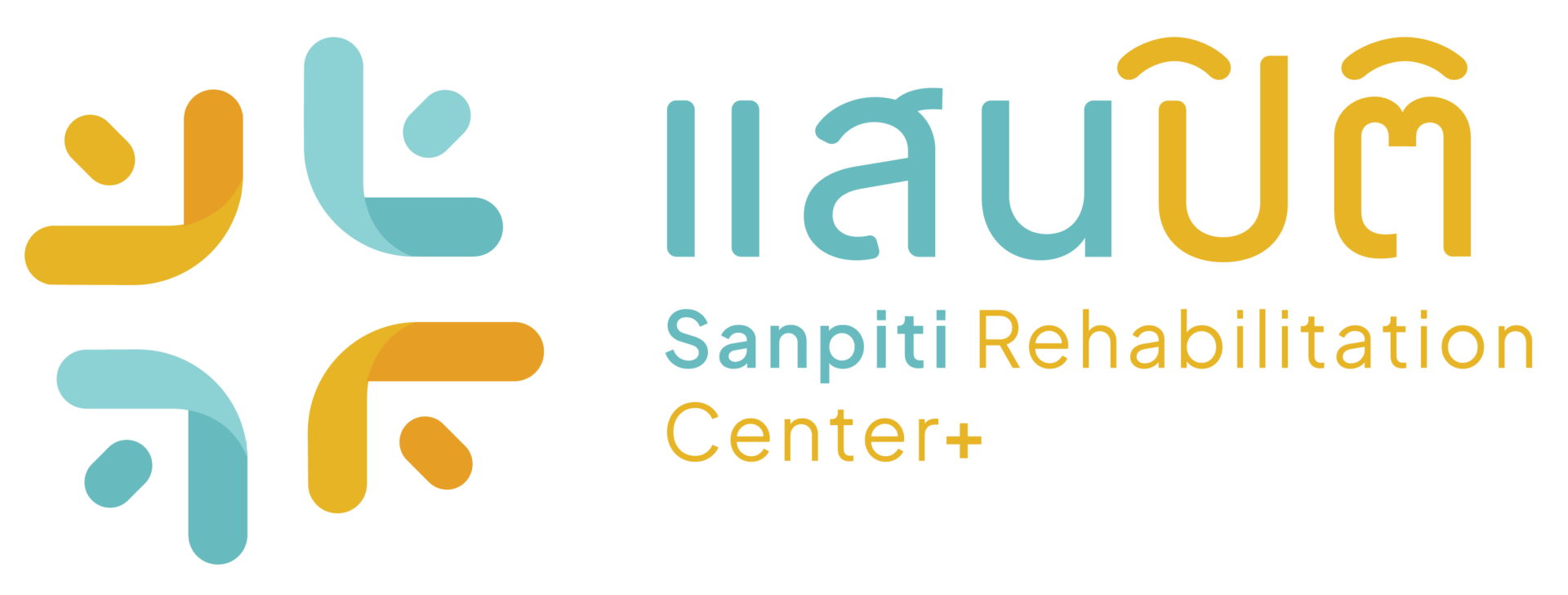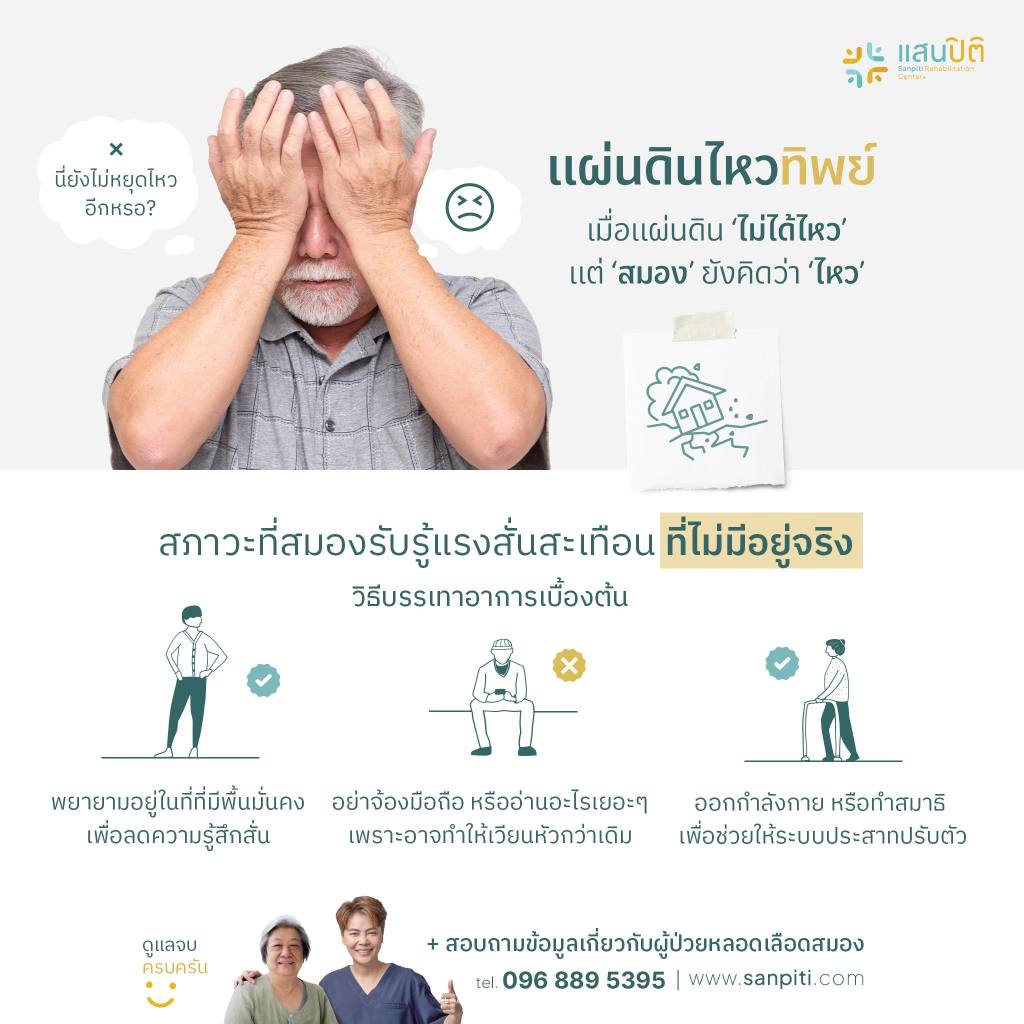“Phantom Earthquake” or Stroke? Don’t Ignore Warning Signs from Your Brain
Have you ever felt like the world is swaying or shaking when no one around you feels anything? Some people jokingly call this sensation a “phantom earthquake,” but did you know that this strange feeling might not just be stress or imagination, but could be a “warning sign from your brain” that shouldn’t be ignored?
In this article, we’ll introduce you to symptoms that might seem insignificant but could be hiding the risk of Stroke and the appropriate rehabilitation methods if symptoms have already occurred.
What is a “Phantom Earthquake”?
The term “phantom earthquake” is commonly used to describe the sensation of feeling as if the floor or surrounding environment is swaying or shaking when in reality no earthquake is occurring.
This sensation can result from several causes, including:
- Vestibular disorders
- Mal de Débarquement Syndrome (MdDS)
- Stress or anxiety
- Early warning signs of a stroke
Stroke and Symptoms You May Not Know About
When talking about “stroke,” most people think of obvious symptoms like facial drooping, slurred speech, or arm weakness. However, in reality, certain types of strokes, especially those occurring in the posterior circulation of the brain, may present with different symptoms such as:
- Sudden severe dizziness
- Feeling as if the world is spinning or swaying
- Unsteady gait or balance problems
- Blurred vision, double vision, or partial vision loss
- Feeling like the “ground is unstable” or experiencing a “phantom earthquake”
- Sudden nausea and vomiting along with other symptoms
According to studies in the American Heart Association’s Stroke journal, more than 25% of stroke patients experience dizziness as an initial symptom, but it’s often misdiagnosed as an inner ear condition, leading to delayed treatment that affects the severity of the disease and recovery potential.
How Can We Distinguish Between Different Conditions?
| Symptoms | Possible Condition | Recommended Action |
|---|---|---|
| Dizziness after getting off a boat/airplane | MdDS | Monitor; if not improving within 1-2 weeks, see a doctor |
| Room spinning, nausea, vomiting | Inner ear inflammation | See an ENT specialist |
| Unsteady gait, slurred speech, visual disturbances | Stroke | Seek emergency medical care immediately – every minute counts |
If any symptom occurs suddenly, accompanied by dizziness or a “phantom earthquake” sensation, you should see a doctor for diagnosis as soon as possible
Research from the Journal of Stroke and Cerebrovascular Diseases found that patients who come to the hospital with dizziness alone have a 3-5% chance of having a stroke, but with additional risk factors such as high blood pressure, diabetes, or high cholesterol, the probability increases to 10-25%.
“Phantom Earthquake” Is Not Something to Take Lightly
Although the sensation of “world swaying” may seem harmless at first, if it occurs frequently or becomes more severe, you should undergo a thorough examination, especially if accompanied by symptoms such as:
- Slow or slurred speech
- Weakness in one side of the body (arm or leg)
- Blurred vision or visual disturbances
- Sudden severe headache
- Numbness in the face or limbs on one side
Doctors may recommend MRI or MRA scans to examine the cerebrovascular system in detail, which can provide more accurate diagnosis than standard CT scans.
Stroke Rehabilitation – Hope After Crisis
If diagnosed with a stroke, appropriate and rapid rehabilitation is crucial. Studies from the US National Institute of Neurological Disorders and Stroke found that beginning rehabilitation within 24-48 hours after stable condition increases recovery chances by more than 60%.
Effective rehabilitation includes:
1. Physical Rehabilitation
- Physical therapy to restore movement and balance
- Occupational therapy to train daily living activities
- Speech therapy for those with speech and swallowing problems
2. Specialized Rehabilitation Programs
- Balance training for those experiencing “phantom earthquake” sensations after stroke
- Swallowing training for those with dysphagia
- Visual rehabilitation for those with vision problems
3. Continuous Care
- Regular follow-up on treatment results
- Adjusting rehabilitation plans according to progress
- Nutritional counseling to prevent recurrence
Prevention is Better Than Risking a Stroke
Brain health care shouldn’t start when you’re already ill. You should:
- Exercise regularly, at least 150 minutes per week
- Control blood pressure, cholesterol, and blood sugar to normal levels
- Get adequate rest, 7-8 hours per night
- Avoid smoking and alcohol consumption
- Have annual health check-ups, especially if you have a family history of stroke
Data from the Asian Stroke Foundation (AASF) indicates that strict control of risk factors can reduce the chance of stroke by up to 80%.
Sanpiti Stroke Rehabilitation Center – Specialists in Rehabilitation and Care
At Sanpiti Stroke Rehabilitation Center, we specialize in holistic care and rehabilitation for stroke patients with an experienced multidisciplinary team consisting of:
- Neurologists
- Neurological physical therapists
- Speech therapists for speech and swallowing rehabilitation
- Specialized stroke nurses
- Psychologists providing counseling for both patients and families
Our rehabilitation programs are individually designed, covering:
- Movement and balance rehabilitation
- Swallowing training for those with dysphagia
- Speech and communication rehabilitation
- Daily living skills rehabilitation
- Palliative care for bedridden patients
Conclusion
A “phantom earthquake” may be just a simple neurological symptom, but it could also be an initial sign of a stroke. If symptoms occur frequently or become more severe, don’t wait – see a doctor promptly to assess your risk.
And if you are diagnosed with a stroke, appropriate rehabilitation is the key to a good quality of life.
Because when it comes to the brain, every second counts, and effective rehabilitation is new hope.
✅ Share this article with friends or family you care about ✅ If you have abnormal symptoms, don’t wait until it’s too late! ✅ Brain health is just as important as heart health
References
- Information about Stroke
- Mal de Débarquement Syndrome (MdDS) or “Phantom Earthquake” Symptoms
- Reliable Thai Health Information Sources
- Stroke Rehabilitation
For more information about stroke rehabilitation, contact:
- Phone: 096-889-5395
- Website: www.sanpitinursinghome.com
#Stroke #PhantomEarthquake #StrokeRehabilitation #Hemiplegia #Paralysis #PhysicalTherapy #Sanpiti #SanpitiRehab #StrokeRehabilitationCenter #StrokeWarningSign #Dizziness #InnerEar

